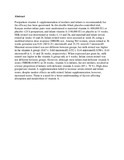The effects of maternal and infant vitamin A supplementation on vitamin A status: a randomised trial in Kenya.

View/
Date
2007Author
Ayah, RA
Mwaniki, DL
Magnussen, P
Tedstone, AE
Marshall, T
Alusala, D
Luoba, A
Kaestel, P
Michaelsen, KF
Friis, H
Type
ArticleLanguage
enMetadata
Show full item recordAbstract
Postpartum vitamin A supplementation of mothers and infants is recommended, but the efficacy has been questioned. In this double-blind, placebo-controlled trial, Kenyan mother-infant pairs were randomised to maternal vitamin A (400,000 IU) or placebo <24 h postpartum, and infant vitamin A (100,000 IU) or placebo at 14 weeks. Milk retinol was determined at weeks 4, 14 and 26, and maternal and infant serum retinol at weeks 14 and 26. Infant retinol stores were assessed at week 26, using a modified relative dose response (MRDR) test. Among 564 women, serum retinol at 36 weeks gestation was 0.81 (SD 0.21) micromol/l, and 33.3% were<0.7 micromol/l. Maternal serum retinol was not different between groups, but milk retinol was higher in the vitamin A group: (0.67 v. 0.60 micromol/l; 0.52 v. 0.44 micromol/l; 0.50 v. 0.44 micromol/l at 4, 14 and 26 weeks, respectively). When expressed per gram fat, milk retinol was higher in the vitamin A group only at 4 weeks. Infant serum retinol was not different between groups. However, although most infants had deficient vitamin A stores (MRDR>0.06%) at 26 weeks, vitamin A to infants, but not mothers, resulted in a lower proportion of infants with deficient vitamin A stores (69 v. 78 %). High-dose postpartum vitamin A supplementation failed to increase serum retinol and infant stores, despite modest effects on milk retinol. Infant supplementation, however, increased stores. There is a need for a better understanding of factors affecting absorption and metabolism of vitamin A.
URI
http://www.ncbi.nlm.nih.gov/pubmed/17391562http://erepository.uonbi.ac.ke:8080/xmlui/handle/123456789/58191
